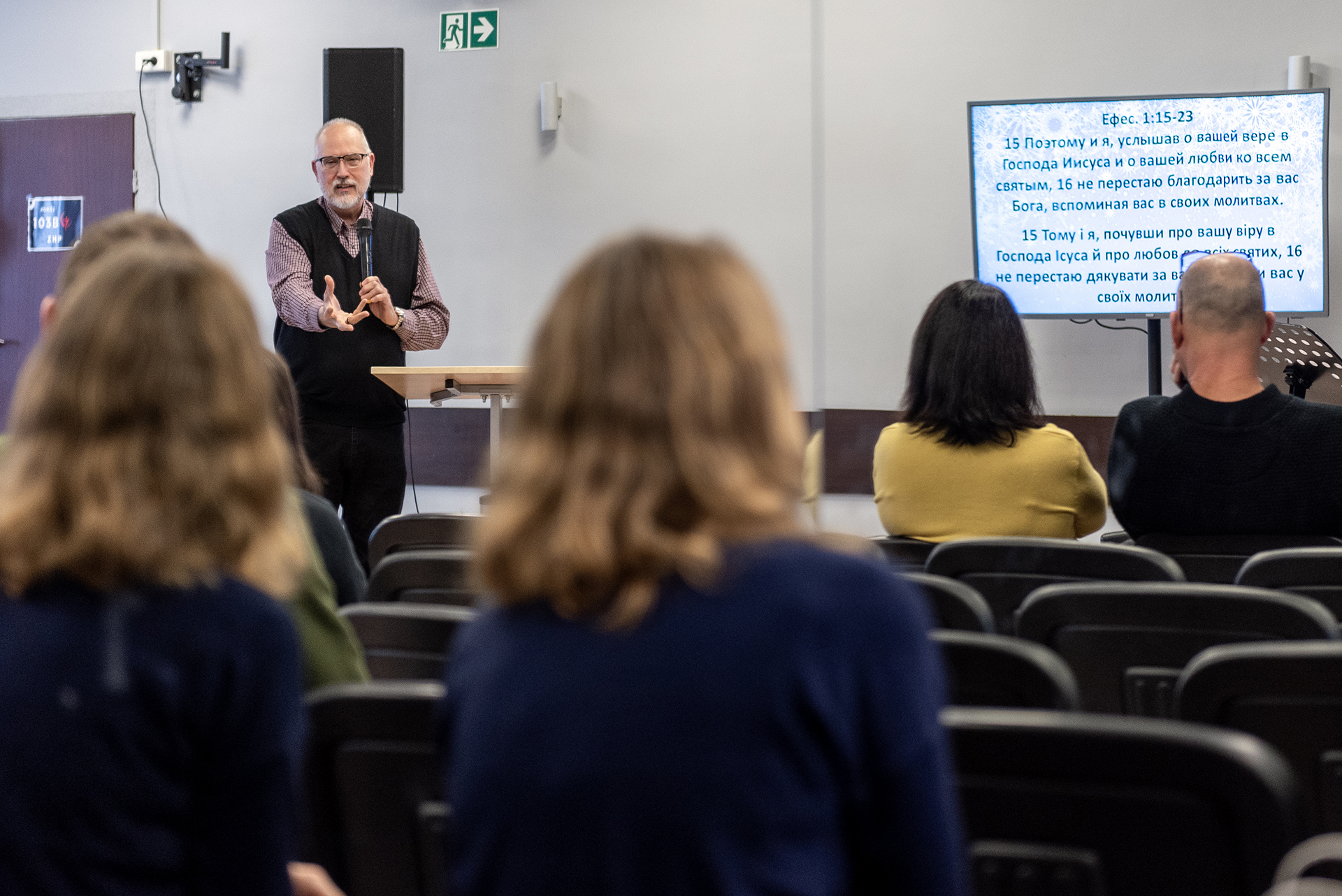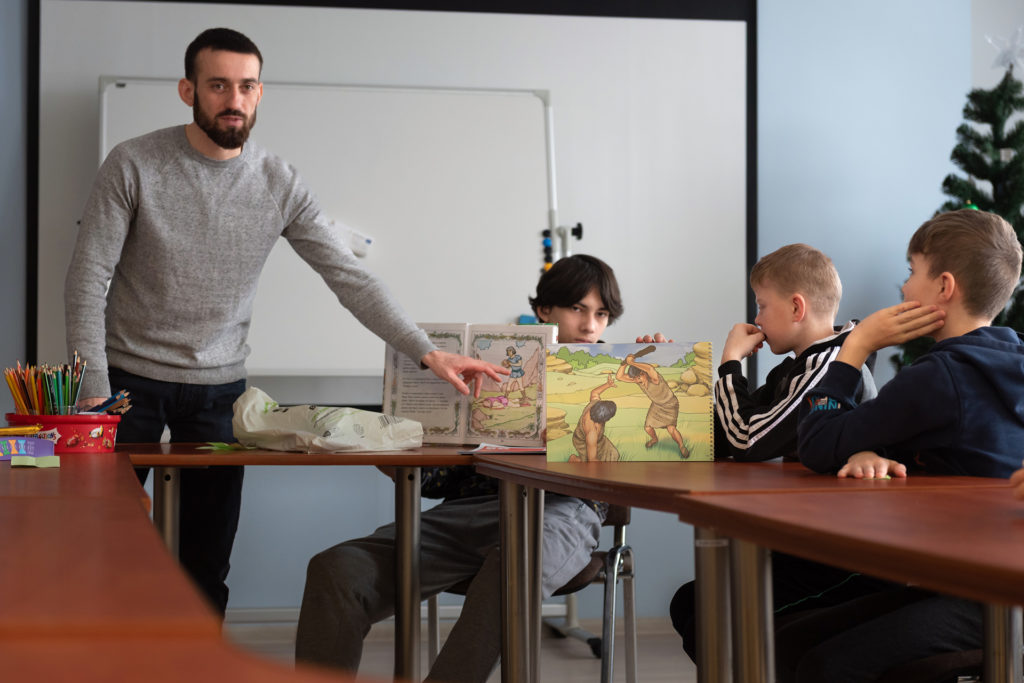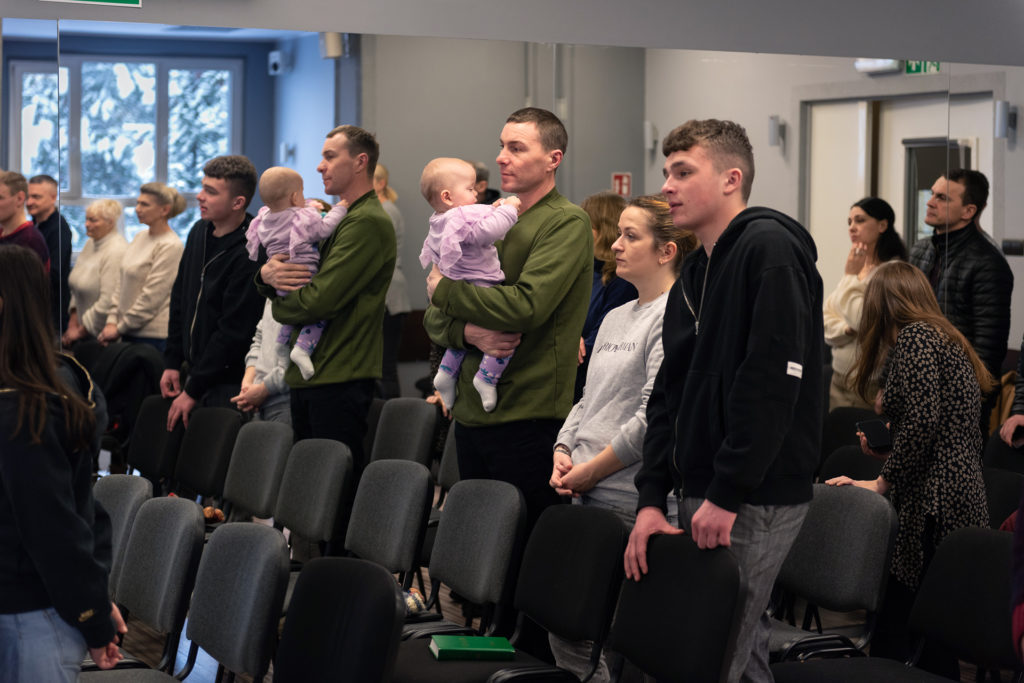To the left of the congregation of Ukrainian refugees, freshly fallen snow weighs down the fir trees outside the window. To the right, the mirror plays a cruel trick — it gives the illusion of twice as many people as there are.
It’s chilling because, in a way, it represents husbands, fathers and brothers who couldn’t leave Ukraine due to their age and the need for able-bodied men. Throughout the congregation, tears slide down cheeks as believers sing a worship song that has taken on new meaning in the past year, “A Prayer for Ukraine.”
My God, I pray for our Ukraine,
My God, I pray to You for the people
You forgive them, You save them
And show us Your mercy
My God, I know that You will be with us“A Prayer for Ukraine.”
They sing in Ukrainian, a comfort in itself. Many Ukrainian Christian refugees attended Polish church services. They are meaningful, but not in their heart language — the language in which they pray, dream and speak to loved ones.
Ukrainians found their Savior in this church, meeting in a room that looks like it may have been a dance studio in a community center. The new Christians include a teenager, who, as a child, watched his alcoholic mother die, and a woman who stumbled upon the church the day before continuing to Germany. Also, Nadia, bitter after a devastating divorce, recovered her joy through the faithful love shown by church members and has invited many to church and outreach events. Sveta is a God-fearer, open but not yet committed. Small acts of love, like the church members handing her a present and singing “Happy Birthday” at the end of a service, show her she belongs.

IMB missionary Dan Upchurch preaches from Ephesians 1:15-23 to the Ukrainian refugee congregation of Christian Community Church of Zory in Zory, Poland. Dan and his wife, Lori, planted the church with their national partner Bartosz Szymczyk. IMB Photo
IMB missionaries Dan and Lori Upchurch and their ministry partners, Bartosz and Zhanna Szymczyk, a Polish and Ukrainian missionary couple, recognized the need for a Ukrainian-language church in Zory, Poland. Both the Upchurches and the Szymczyks served in Ukraine before the war and evacuated to Bartosz’s hometown in Poland.
Last year, the two couples founded Christian Community Church and provided a space for worship, service, community and belonging.
Heart language and service
Dan said he’s found Ukrainians need three things for life to seem like it’s worth living — fellowship, celebratory events and music.
“There’s a tension here because you don’t want Ukrainians to feel like spiritual tourists who are just kind of roaming,” Dan said. “They need to be a part of a community. They need to be a part of a group where they’re using their gifts and their talents and trying to impact lives.”
Bartosz agreed.
“We’ve seen that forming new Ukrainian congregations here is a more fruitful approach to ministry than integration into a Polish church,” Bartosz said. “When they go to a Polish service, they may understand what is being said, but they’re just attenders. They are just sitting there passively.”
Uncertainty of the future is not an excuse for not serving.
“We’ve already had almost 12 months of this. …,” he said. “We don’t know how long people will be here, but we don’t want that to be an excuse for not being involved in ministry.”
Christian Community Church members have found fellowship, celebration, music and purpose.

Sasha, a Ukrainian believer and refugee, leads a Sunday School lesson. Sasha and other church members take church involvement seriously. IMB Photo
Before the service, Luba makes coffee each week and helps in Sunday school. Tanya curates the Sunday School curriculum. Vadim and Oksana lead worship. Radick, who became a Christian at the church, helps lead the youth group. Sasha does it all — he helps with sound for the service, teaches Sunday School and is in the rotation to preach.
Serving also involves holiday outreaches. Dan said Ukrainians love reasons to celebrate, so hosting outreach events during the holidays like Easter, Thanksgiving and Christmas is effective.
Church members invited 300 Ukrainians to a Thanksgiving outreach service. For many, this was the first sermon they had heard.
The Thanksgiving event was also when regular attendees began to really see the church as “theirs.” The Szymczyks and Upchurches prayed this would happen.
“I think that [serving] helps their sense of who they are, because without something meaningful to participate in, they don’t know who they are,” Dan said.
Revolving door
During the first few Sundays of the church’s existence, Dan said it was like “preaching in a train station.” People were passing through on their journey to other cities and destinations in Europe in the forced dispersion of Ukrainians. Christian Community Church was the only church offering Ukrainian-language services, and in the early months of the war, they had two services. Each week around 100 people came, and 60 of those were new visitors.
The first Sunday Dan preached Bartosz’s eyes widened as the potential missed opportunity dawned on him. Bartosz hastened to the front of the room after the first service.
“We can’t do it this way,” he told Dan. “We’ve got to give an invitation.”

Oksana, left, and Vadim, lead worship at Christian Community Church of Zory in Zory, Poland. Oksana and Vadim are twice the refugee — having fled both Crimea and and mainland Ukraine due to the invasion and war. IMB Photo
Churches in this region of Europe don’t usually give invitations after Sunday morning worship services. Invitations are usually reserved for evangelistic outreaches.
“We don’t know if we will ever see these people again, and we have to call them to make a decision,” Bartosz continued.
In the second service, Dan gave an invitation. After the service, a woman came forward and told him she’d meant to take that step of faith and commit her life to Christ and asked if he could pray with her.
The following day she was heading to Germany. Had Dan not given the invitation, she may have continued to delay her decision. Invitations became a weekly fixture of church services through the end of the summer when new refugee numbers decreased.
Tragedy and trust
Radick committed to faith in Jesus and an eternal family at the church, and members recently celebrated his baptism. His conversion brought tears to Bartosz and Zhanna’s eyes.
“With Radick, we had to go through one of the most tragic and difficult parts of our ministry,” Bartosz said.

Ukrainian Christians worship in the Christian Community Church of Zory, in Zory, Poland, planted by IMB missionaries Dan and Lori Upchurch and Polish missionary Bartosz Szymczyk. The church plant allows Ukrainian Christians to worship in their mother tongue. Radik Liskovchuk, front right, became a Christian through the witness of Szymczyk and the church. The mirrors in the church make it appear there are twice the number of people in attendance. IMB Photo
The couple met Radick in Ukraine through their children’s and youth ministry when he was 5 years old. With pain evident in his voice, Bartosz recounts watching with Radick and his brother as their mother died from a vodka overdose.
“I didn’t know what to do, I just cried along with them,” Bartosz said. “God just really drew us together through that.”
“We’ve prayed for these kids probably more than we have our own,” Bartosz added.
Zhanna had concerns about who the boys would become as adults. Now, Radick, 18, is a growing Christian who wants to be a missionary — just like Bartosz — and leads out in the youth group.
Bricks in the building
Bartosz said without the generous gifts from the American church they wouldn’t have been able to do all they have. Money Southern Baptists donated was used to buy Christmas gifts and helped fund a camp for refugee children.
“People in a different country gave money that could help and support our ministry and gave kids a chance. It just really showed that in God’s kingdom, everybody has the ability to lay their own little brick in the building.
“Whether they prayed, whether they gave, whether they were actually here, they were a part of the ministry,” Bartosz said.

